新人教版英语七年级上册Unit4课件
合集下载
人教版(2024)Unit 4 My Favourite Subject 课件(英语人教版七年级上册

1 It's interesting to learn about the past.(P45)
interesting
adj. 有趣的
It is interesting to do sth. 表示做某事真有趣
(1)这本书真有趣!This book _is_s_o__in_t_e_r_e_st_i_n_g__! (2)在公园放风筝是有趣的。
v. 帮助
help sb. with sth.=help sb. (to) do sth. 帮助某人做某事
你可以叫老师帮我学习英语吗? Can you ask the teacher to h__el_p__m_e__w_i_th__E_n_g_l_is_h_/_h_e_lp__m__e _s_tu_d_y__E_n_g_l_is_h____?
Is English Tom's _f_a_v_o_u_r_it_e__ _su__b_je_c_t_?
4. 爷爷周二早上在公园散步。 Grandpa walks in the park _o_n_ _T_u_e_s_d_a_y__ m__o_r_n_i_n_g_s.
5. 每天都吃同样的早餐让人厌倦。 It _is__ _b_o_r_in_g___ _to__ have the same breakfast every day.
Peter is Ella's classmate. He has Chinese and maths first today. He 4. _li_k_e_s_(like) Chinese. He thinks it's fun. But he doesn't like maths. Maths is boring to 5. _h_im___(he). But every subject is important. He should study hard. He also has IT and PE today. PE is his favourite subject. He thinks it's exciting.
初中英语新人教版七年级上册Unit 4(第1课时)教学课件(2024秋)

Warming up
Other subjects:
art
PE
maths
history /ˈhɪstri/
Music
Warming up
What class are they having now?
Math
They are having an English class.
Music
Pre-listening
Language points
1. Ella doesn’t like history/geography because it’s hard/ boring.(教材P44 1c) hard adj.困难的 adv.努力地 (1)[形容词]困难的 近义词为difficult,反义词为 easy。 ➢ The problem is too hard.这个问题太难了。 (2)[副词]努力地 ➢ He worked hard all the time and finally his dream came
/ɪkˈsaɪtɪŋ/ 令人激动的
While-listening
Listen to the script and check your answers. Conversation 1 Fu Xing: Hi, Ella. Are you OK? Ella: Hi, Fu Xing. Not really. Today is Tuesday. Fu Xing: So? 不,不怎么好 Ella: I have history on Tuesday mornings. Fu Xing: You don’t like history? Ella: No, it’s hard for me.
While-listening
初中英语新人教版七年级上册Unit 4 (第5课时)教学课件(2024秋)

While-writing
Sample writing
点明最喜欢的科目及喜欢它的一个原因
My name is Li Hong,13 years old. I’m from Dalian. My favourite subject is science because the class is relaxing and interesting. My science teacher, Mr Qu, is good with students. He is humorous and often tells jokes in class. He is strict but nice. We all like him.
While-writing
While-writing
如何写有关自己和他人最喜欢的科目的文章 Step 1:简要介绍自己的情况
My name is…/I am… I am...years old. I am/come from...
While-writing
Step 2:介绍自己最喜欢的科目及原因 ①与学科和学科特征相关的词汇
使用be good with 短语, 点明了任课老师的特点
While-writing
We often do experiments in class to understand the lessons well.
It makes me happy. I want to be a scientist in the future, so I
Exercises
go to the museums first when I go to some big cities. My history teacher also tells us some funny stories in class. My favourite school day is Monday because I have history that day. I think it is interesting and useful.
人教版七年级英语上册unit4课件(共84张PPT)
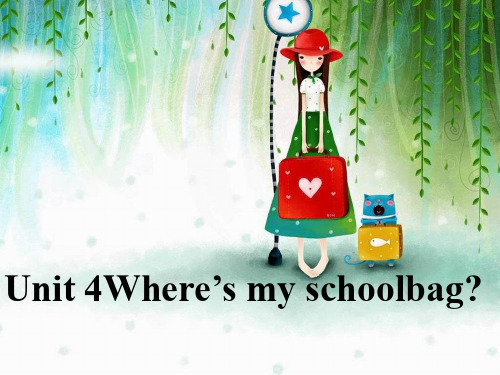
games? • -They are under your bed.
Where + are +形容词性物 主代词+名词复数?
•They +are +介词+形容 词性物主代词+名词单数。
•或者:They +are +介词 +the+名词单数。
clock books footballs • PAIRWORK telephone plant apples • Guess: Where
A_r_e__ _y_o_u_r_ books in the ___b__a_g__? Yes, _t_h_e_y __a_r_e_.
下列各题中均有一处错误。请你指出并
改正。
1. Are these your ppeennccililbbooxx?es
A
B CC
2. Where’s your bookI?t’sI’m in my
• 三.导学流程
• 1.自主预习案
• (1)I don’t know. 我不知道。
• 在不知如何回答别人的问题时常用词 句作答。有时为了礼貌在前面加sorry。其 中know 是实义动词,意思是“知道;了 解”;don’t 是do not 的缩写形式。
• eg:Where’s Lucy? Sorry, I don’t
3. Where aisre my yellow jacket, Mom?
A BB C
4. My ppaarerenntst are in the room.
A BB
C
5. Is your photo on the sofa?
A
B
Yes, itsiist.
Where + are +形容词性物 主代词+名词复数?
•They +are +介词+形容 词性物主代词+名词单数。
•或者:They +are +介词 +the+名词单数。
clock books footballs • PAIRWORK telephone plant apples • Guess: Where
A_r_e__ _y_o_u_r_ books in the ___b__a_g__? Yes, _t_h_e_y __a_r_e_.
下列各题中均有一处错误。请你指出并
改正。
1. Are these your ppeennccililbbooxx?es
A
B CC
2. Where’s your bookI?t’sI’m in my
• 三.导学流程
• 1.自主预习案
• (1)I don’t know. 我不知道。
• 在不知如何回答别人的问题时常用词 句作答。有时为了礼貌在前面加sorry。其 中know 是实义动词,意思是“知道;了 解”;don’t 是do not 的缩写形式。
• eg:Where’s Lucy? Sorry, I don’t
3. Where aisre my yellow jacket, Mom?
A BB C
4. My ppaarerenntst are in the room.
A BB
C
5. Is your photo on the sofa?
A
B
Yes, itsiist.
初中英语新人教版七年级上册Unit 4 (第3课时) 教学课件(2024秋)
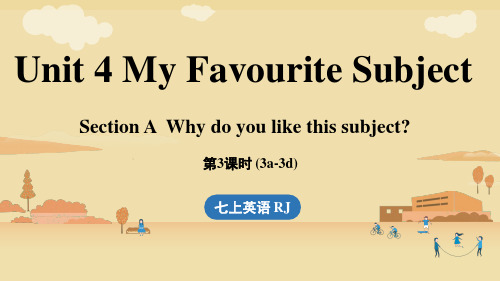
记住,总会有人关心你。
Language point
【辨析】
remember to do sth. 记着做某事,此事目前未做。
remember doing sth. 记得做某事, 此事目前已做。
➢ Remember to show love to your father.记得向你爸 爸表达爱意。
➢ I remember seeing the movie at the cinema.我记得 我在电影院看过这部电影了。
Homework
1. 熟记and、but和because的用法。 2. 针对3d调查,写一篇调查报告,不少于70词,
注意连词的使用。
3. She likes maths she is good with numbers. A. and B. but C. or D. because
Summary
Grammar
连词and、but和because的用法
Words and expressions
listen to, good at, remember, as
5. My favourite subject is
geography
6. I don’t like drawing,
A. and he often helps me with my English.
B. because I like travelling. C. but I like my art teacher a lot. D. and draw pictures. E. but I often walk to school. F. because it’s fun to learn to use
because后接句子,because of后接名词。
Language point
【辨析】
remember to do sth. 记着做某事,此事目前未做。
remember doing sth. 记得做某事, 此事目前已做。
➢ Remember to show love to your father.记得向你爸 爸表达爱意。
➢ I remember seeing the movie at the cinema.我记得 我在电影院看过这部电影了。
Homework
1. 熟记and、but和because的用法。 2. 针对3d调查,写一篇调查报告,不少于70词,
注意连词的使用。
3. She likes maths she is good with numbers. A. and B. but C. or D. because
Summary
Grammar
连词and、but和because的用法
Words and expressions
listen to, good at, remember, as
5. My favourite subject is
geography
6. I don’t like drawing,
A. and he often helps me with my English.
B. because I like travelling. C. but I like my art teacher a lot. D. and draw pictures. E. but I often walk to school. F. because it’s fun to learn to use
because后接句子,because of后接名词。
人教版(2024)英语七年级上册Unit4My Favotite Subject词汇课件
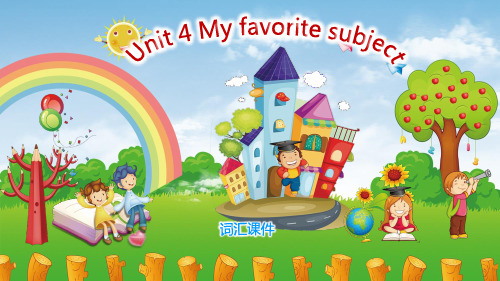
• 许多人申请了这工作。
• The number of employees was reduced from 40 to 25.
• 雇员人数从40人减少到了25人。
reason n.原因,理
由
• I'd like to know the reason why you're so late. • 我想知道你为什么迟到那么长时间。
everyone pron 每个人
• Everyone cheered and clapped. • 人人都鼓掌欢呼。 • Everyone brought his or her partner to the party. • 个个人都携伴参加聚会 • The teacher commented on everyone's work. • 老师对每个人的作业都作了讲评。
• 我叫她将来更仔细一些。
term n.学期
• Many students now have paid employment during term . • 现在许多学生在上学期间就从事有薪工作。 • It's nearly the end of term. • 学期快要结束了。 • I'm not happy with his work this term. • 我对他这学期的表现不满意。
help sb. with帮助某人做某事
He always helps with the housework. 他总是帮着做家务
listen to 听
I listen to music for relaxation. 我听音乐放松心情。
in class 课堂上 Don't listen to music in class. 在课堂上不要听音乐。
新人教版七年级英语上册Unit4 单元语法聚焦课件(共19张PPT).ppt

单元语法聚焦四 Ⅱ.根据图片提示完成下面的对话,每空一词 1.
A: Where's Bob? B: ___H_e____ ____is____ ___i_n____ a car.
单元语法聚焦四 2.
A: Where is the computer? B: It's___o_n____ ___th_e____ ___d_e_s_k__.
单元语法聚焦四
2. 表示方位的介词 (1)介词一般位于名词或代词前,表示该词与其他成分的关系。 (2)常用的方位介词(短语): in front of在……(外部的)前面; behind在……后面; near在……附近; next to靠近; between在……中间; at在……(指小地点);in在……里; under在……下;on在……上。如:
单元语法聚焦四
4.Is the chair in your room? (作肯定回答) __Y_e_s___, __i_t ___ __is____. 5.My books are in_the_bookcase. (改为否定句)
My books __a_r_e_n_'t__ in the bookcase.
。2020年8月6日星期四2020/8/62020/8/62020/8/6
• •
THE END 15、会当凌绝顶,一览众山小。2020年8月2020/8/62020/8/62020/8/68/6/2020
16、如果一个人不知道他要驶向哪头,那么任何风都不是顺风。2020/8/62020/8/6August 6, 2020
• 11、夫学须志也,才须学也,非学无以广才,非志无以成学。2020/8/62020/8/62020/8/6Aug-206-Aug-20
Unit 4Section A(Grammar Focus)(课件)七年级英语上册(人教版2024)
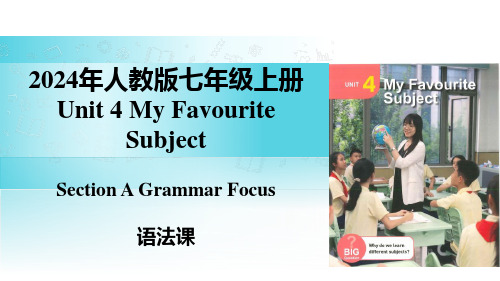
because是连词,意为“因为”,可以用来引导原因状语从句。汉语中的“ 因为……所以……”常常连用,但在英语中because和so不能同时连用。 如:
因为数学有趣所以我喜欢它。 Because Math is interesting, I like it. = Math is interesting, so I like it.
3. It takes us into a world full of 1,2,3 and X,Y,Z…It's difficult but useful!
/'ju:sfl/ adj. 有用的;有益的
4. In this class, we can play football and basketball.
A.and
B.but
C.or
D.so
C 6.We’d better be happy every day ________ life is so short.
D: ...
Description words :
fun
relaxing
interesting
exciting(令人兴奋 的) useful(有用的) important(重要的) easy(简单的)
…
grammar n. 语法 Grammar Focus
focus n. 聚焦
We are going to learn something about how to use conjunction and, but,
grammar 连词 so
(4)so :表示因果关系,连接表示因果的句子。
在一个句子中不能同时出现because和so.
These buildings were over 50 years old, so they were not strong enough. 这些建筑物已有50多年的历史,因此不够坚固。
因为数学有趣所以我喜欢它。 Because Math is interesting, I like it. = Math is interesting, so I like it.
3. It takes us into a world full of 1,2,3 and X,Y,Z…It's difficult but useful!
/'ju:sfl/ adj. 有用的;有益的
4. In this class, we can play football and basketball.
A.and
B.but
C.or
D.so
C 6.We’d better be happy every day ________ life is so short.
D: ...
Description words :
fun
relaxing
interesting
exciting(令人兴奋 的) useful(有用的) important(重要的) easy(简单的)
…
grammar n. 语法 Grammar Focus
focus n. 聚焦
We are going to learn something about how to use conjunction and, but,
grammar 连词 so
(4)so :表示因果关系,连接表示因果的句子。
在一个句子中不能同时出现because和so.
These buildings were over 50 years old, so they were not strong enough. 这些建筑物已有50多年的历史,因此不够坚固。
人教版七年级英语上册unit4课件

• (1).Come on! • (2). I think it’s in your grandparents’
room. 等句型。 人教版七年级英语上册unit4课件
• 二、学习重难点 • 学习重点: • 1. 学会P20页的9个新单词 : • come come on desk think room their
games? • -They are under your bed.
人教版七年级英语上册unit4课件
Where + are +形容词性物 主代词+名词复数? •They +are +介词+形容 词性物主代词+名词单数。 •或者:They +are +介词 +the+名词单数。
人教版七年级英语上册unit4课件
4. A: _W_h_e_r_e_'s_ the cat? B:_I_t__ is _u_n_d_e_r__ the tree.
• 1.自主预习案
• (1)come on “快点儿;加油”。用来催促或 鼓励别人。
• eg:Come on, we are late.
• 快点儿,我们迟到了。
• 其他用法:
人教版七年级英语上册unit4课件
• Where +is +形容词性物主 代词+名词单数?
• It is +介词+形容词性物主 代词+名词单数。 • 或者:It is +介词+the+名 词单数。
人教版七年级英语上册unit4课件
1-Where are my books? • - They are on the sofa. • 2-Where are my pencil boxes? • -They are in your schoolbag. • 3-Where are my computer
room. 等句型。 人教版七年级英语上册unit4课件
• 二、学习重难点 • 学习重点: • 1. 学会P20页的9个新单词 : • come come on desk think room their
games? • -They are under your bed.
人教版七年级英语上册unit4课件
Where + are +形容词性物 主代词+名词复数? •They +are +介词+形容 词性物主代词+名词单数。 •或者:They +are +介词 +the+名词单数。
人教版七年级英语上册unit4课件
4. A: _W_h_e_r_e_'s_ the cat? B:_I_t__ is _u_n_d_e_r__ the tree.
• 1.自主预习案
• (1)come on “快点儿;加油”。用来催促或 鼓励别人。
• eg:Come on, we are late.
• 快点儿,我们迟到了。
• 其他用法:
人教版七年级英语上册unit4课件
• Where +is +形容词性物主 代词+名词单数?
• It is +介词+形容词性物主 代词+名词单数。 • 或者:It is +介词+the+名 词单数。
人教版七年级英语上册unit4课件
1-Where are my books? • - They are on the sofa. • 2-Where are my pencil boxes? • -They are in your schoolbag. • 3-Where are my computer
新人教版英语七年级上册Unit4ppt课件
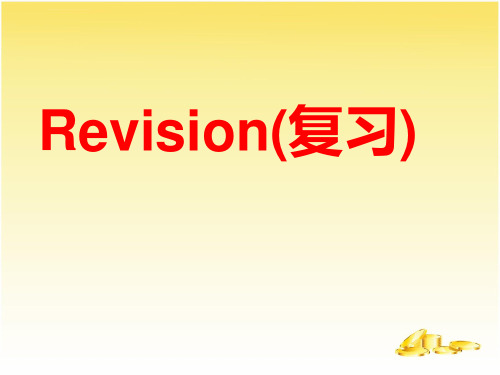
Where _a_r_ethe books ? _T_h_e_y_’r_e_ in the __b_o_o_k_c_a_s.e
采用PP管及配件:根据给水设计图配 置好PP管及配 件,用 管件在 管材垂 直角切 断管材 ,边剪 边旋转 ,以保 证切口 面的圆 度,保 持熔接 部位干 净无污 物
A: Where’s the …? B: It’s …
Where’s Tom? It’s on the box.
采用PP管及配件:根据给水设计图配 置好PP管及配 件,用 管件在 管材垂 直角切 断管材 ,边剪 边旋转 ,以保 证切口 面的圆 度,保 持熔接 部位干 净无污 物
Where’s Tom? It’s under the box.
采用PP管及配件:根据给水设计图配 置好PP管及配 件,用 管件在 管材垂 直角切 断管材 ,边剪 边旋转 ,以保 证切口 面的圆 度,保 持熔接 部位干 净无污 物
采用PP管及配件:根据给水设计图配 置好PP管及配 件,用 管件在 管材垂 直角切 断管材 ,边剪 边旋转 ,以保 证切口 面的圆 度,保 持熔接 部位干 净无污 物
It's Tom. Where’s Tom? It’s in the box.
where’s = where is
采用PP管及配件:根据给水设计图配 置好PP管及配 件,用 管件在 管材垂 直角切 断管材 ,边剪 边旋转 ,以保 证切口 面的圆 度,保 持熔接 部位干 净无污 物
sofa
/әu/
采用PP管及配件:根据给水设计图配 置好PP管及配 件,用 管件在 管材垂 直角切 断管材 ,边剪 边旋转 ,以保 证切口 面的圆 度,保 持熔接 部位干 净无污 物
chair
2024年人教版新教材七年级英语上册Unit 4单词精讲课件

新七年级上册词汇精讲 Unit4
2024新人教版七年级下册
01 02 03 04 05
Starter Unit1
Starter Unit2
Starter Unit 3 Unit 1
Section A , Section B Unit 2
Section A , Section B
06
Unit 3 Section A , Section B
➢ 辨析形容词:boring /bored "bored" 通常用来形容人,强调的是人的内心感受。 He felt bored during the long meeting.他在冗长的会议中感到厌倦。 "boring" 则可以用来形容人或事物,但更多的是用来形容事物。 Her speech was boring. 他的演讲是无聊的。 ➢ 趁热打铁: Peter is so _______ at such a ______ book. A. bore; bore B. boring; boring C. bored; boring D. boring; bored
remember to do sth. ✓ 记得做过某事(已做过)
remember doing sth.
➢ 趁热打铁: I remember ___ the door, but it's open now. A. to lock B. locking C. locked Please remember ___ the book to the library. A.to return B. returning C. return He couldn't remember ___ he had put his keys. A. where B. when C. why
2024新人教版七年级下册
01 02 03 04 05
Starter Unit1
Starter Unit2
Starter Unit 3 Unit 1
Section A , Section B Unit 2
Section A , Section B
06
Unit 3 Section A , Section B
➢ 辨析形容词:boring /bored "bored" 通常用来形容人,强调的是人的内心感受。 He felt bored during the long meeting.他在冗长的会议中感到厌倦。 "boring" 则可以用来形容人或事物,但更多的是用来形容事物。 Her speech was boring. 他的演讲是无聊的。 ➢ 趁热打铁: Peter is so _______ at such a ______ book. A. bore; bore B. boring; boring C. bored; boring D. boring; bored
remember to do sth. ✓ 记得做过某事(已做过)
remember doing sth.
➢ 趁热打铁: I remember ___ the door, but it's open now. A. to lock B. locking C. locked Please remember ___ the book to the library. A.to return B. returning C. return He couldn't remember ___ he had put his keys. A. where B. when C. why
初中英语新人教版七年级上册Unit 4(第4课时)教学课件(2024秋)

Future job singer
While-reading Country
China
Wu Binbin
Subjects
Chinese, history, maths, English, PE, and IT
Favourite subject maths
Reason
Advantage(优势):good with numbers
instruments. I want to be a singer in the future. How about
you? What do you study? What’s your favourite class and
why?
/ˈsɪŋə(r)/歌手
将来
/ˈɪnstrəmənt/ 乐器;工具
Language points
【拓展】busy的常见用法:
be busy with sth. He is busy with his work every day.
忙于某事
他每天都忙于他的工作。
be busy doing sth. Look! The farmers are busy picking
Unit 4 My Favourite Subject
Section B What can you learn from different subjects?
第4课时 (1a-1d) 七上英语 RJ
Learning goals
1. 掌握并正确运用词汇:AM, PM, Canada, French, excellent, instrument, singer, future, in the future, term, work out, problem, in class, magic, life, scientist 2. 掌握结构及句式: ①let sb. do sth.让某人做某事 ②Sb.+want(s) to be...某人想成为…… ③How does sb. feel about...?某人觉得……怎么样?
- 1、下载文档前请自行甄别文档内容的完整性,平台不提供额外的编辑、内容补充、找答案等附加服务。
- 2、"仅部分预览"的文档,不可在线预览部分如存在完整性等问题,可反馈申请退款(可完整预览的文档不适用该条件!)。
- 3、如文档侵犯您的权益,请联系客服反馈,我们会尽快为您处理(人工客服工作时间:9:00-18:30)。
Where’s the baseball? It’s on the table.
Where’s the schoolbag? It’s under the table.
Where’s the…? It’s on/ in/ under ….
box
Where are the baseballs? They’re on the chair.
a desk
a bookcase a sofa
a chair
a bed
keys bags books
CDs schoolbags
1a Match the words with the things in the picture.
1. table __b__ 2. bed _e___ 3. bookcase _h__ 4. sofa _g__ 5. chair _d__ 6.schoolbag _a__ 7. books __f _ 8. keys __c__
Where’s my computer game?
They’re on the sofa.
It’s in your schoolbag.
It’s under your bed.
Exercises
在沙发上
on the sofa
在我的书包里 在桌子下
in my schoolbag
Where are my _____( key)? under the table
Where are the cups?
Are they under the table?
No, they aren’t.
Are they on the table?
Yes, they are.
aren’t=are not
Where are the books?
Are they on the table?
A: Is the dog on the chair?
B: Yes, it is.
A: Is the baseball on the table?
B: No, it isn’t. It’s under the sofa.
A: Are the books on the sofa?
B: Yes, they are.
Where’s=Where is
Where are the plants? They’re under the table.
They’re=They are
Where引导的特殊疑问句 结构: Where+ be动词+主语?
人/物
其中,主语可以是人或物,be动词的单复数由主语决定。
即: Where is/ Where’s +单数?
No, they aren’t.
Are they in the bookcase?
Yes, they are.
A: Where’re the keys? Are they under the table?
B: No, they aren’t. They are on the table.
A: Where’re the pencils? Are they under schoolbag?
Where’s the schoolbag?
Is it under the table? No, it isn’t.
Is it on the table? Yes, it is.
A: Where’s the baseball? Is it under the table?
B: Yes, it is.
It's Tom. Where’s Tom? It’s in the box.
where’s = where is
Where’s Tom? It’s on the box.
Where’s Tom? It’s under the box.
Where is Tom?
in
on
under
in on under
Where are the books?
The books are on the table.
Where are the dogs ?
They’re on the sofa.
TWahlkeraeb’roeu=t thwehtehrienagrse. + 复数 ?
They’re …. = They are….
number the things in the picture.
6
3
2
4 5
2 Where are the things? Number the things in the picture. b
1 2
3
4 5
6
A: Hey, Sally. B: Yes?
A: Is my computer game on the table? 一般疑问句 B: No, it isn’t. It’s in the bookcase.
太好了。
1c Pairwork
Make your own conversations. Use the words in the box.
Where’s the schoolbag?
It’s under the table.
on
in
under
Where are my books?
Where’s my pencil box?
under the box
on the box
in the box
Where’s the…? It’s on/ in/ under ….
Where are the …? They are in/ on /under the…
Where’s the clock? It’s on the chair.
keys Where is your _____(books)?
book Where ____ her ruler ?(be )
Where ____ their erasers?(be )
is
are
Exercises
对划线部分提问 My schoolbag is in the desk. Where’s your schoolbag? His pens are in his pencil box .
bed
/e/
bookcase
/ei/
sofa
/әu/
chair
/e ә /
table /ei/ bed /e/ bookcase /ei/ sofa /әu/ /ә/
chair
/e ә /
schoolbag books /æ /
keys
What’s in my new room?
a table
Where’s=Where is
Where are the plants? They’re under the table.
They’re=They are
hat head
desk
room
2a Listen and number the things [1-6].
2
6
5
3
4
2b Listen again. Find the things from 2a and
A: Are the books on the table?
B: No, they aren’t. They’re in the bookcase.
Where’s the eraser?
Is it on the table? No, it isn’t.
Is it under the table? Yes, it is.
B: No, they aren’t. They’re in the schoolbag.
Are the keys on the sofa?
No, they aren’t. They’re on the table.
2d Read and answer the questions
Mom: Come on, Jack! Jack: Oh, no! Where’s my bag? Mom: Hmm…is it on your desk? Jack: No. And it’s not under the
Where _a_r_ethe books ? _T_h_e_y_’r_e_ in the __b_o_o_k_c_a_s.e
A: Where’s the …? B: It’s …
…… … …
…
Where’s the pencil? It’s in the pencil box. …
Where are the …? They are …
chair. Mom: Oh! It’s on the sofa. Jack: Thank you, Mom.
Err…where’s the map? Mom: I think it’s in your
grandparents’ room. Jack: Yes, it’s on their bed! And my hat? Mom: It’s on your head! Jack: Oh, yeah! Haha!
A: Oh, OK. How about my books? Are they in the
bookcase, too?
=What about来自B: No, they aren’t. They’re on the chair.
A: Oh. So, where’s my pencil box?
那么
B: Hmm… it’s under the sofa.
Where are the keys ? the pencils ? the baseballs ? the rulers ?
